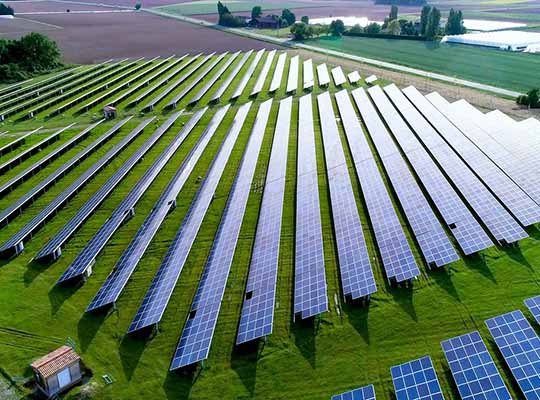
How many of us are aware that Blockchain Is the next big thing for renewable energy? Sadly, very few.
Blockchain has been touted as the next big technological advance – impacting everything from online transactions to e-government. We have seen it impact almost all sectors now. but what does it mean for renewable energy? Blockchain could be the future of renewable energy and the next chapter in smart technology, as the online platform is helping develop consumer-driven power generation. The technology is providing a new level of sophistication to our energy supplies which have previously been reliant on highly centralized systems. The potential opportunities are endless, and by increasing efficiency blockchain could also allow for a substantial reduction of carbon emissions.
What is blockchain?
For starters let us understand blockchain. It is essentially an online register that securely stores information, and serves as a repertoire of knowledge accessible to everyone. Rather than being controlled by one entity, blockchain is spread across multiple computers and uses a form of data logging to ensure that the information cannot be changed or corrupted by anyone else. By decentralizing data and protecting the way it is manipulated, blockchain promotes transparency and the sharing of information. As such, the record has immense potential in helping shape a wave of new technology and our ability to interact with it.
Blockchain Technology in Energy
For consumers, tracking usage has always been a challenge that is often overlooked by grids. With the advent of IoT, renewable energy providers have gained the upper hand in usage tracking and real-time troubleshooting. In some parts of the world, domestic as well as commercial consumers can now benefit out of blockchain-enabled transactive grids and track usage accurately.
Several start-ups are already using blockchain as a tool to make energy grids more accessible and sustainable by promoting data-sharing in real time. The idea behind creating energy grids linked to blockchain is simple: by giving consumers total control over where they source their energy as well as the information behind the production itself it drives competition and promotes sustainable energy.
Consumers using a smart-grid that relies on blockchain will be able to compare their energy providers and buy directly from them. In Estonia, a blockchain-powered smart grid called WePower has been testing just how well a choice-driven energy market could work by teaming up with an independent energy provider who shares their energy data in real time. Consumers helping pilot the program have bought into the grid and been given credits to spend on specific energy sources, giving them the freedom to alter their choices based off of real-time power generation and their prices.
WePower’s CEO Nick Martyniuk says that “blockchain provides the necessary trust for data sharing and creates liquidity as well as accountability between energy buyers and producers. Should the blockchain-based grid take off and become more mainstream, it could open up a whole new market for clean energy as Martyniuk points out, “Even though the cost of renewables has dropped significantly, small to medium size companies don’t have a good way to start buying green energy.”
A Great Opportunity for Clean Energy
A smarter electricity grid giving consumers transparent energy choices could push for more integration of clean energy. Cheaper forms of energy, such as renewables, are set to be the market’s favourite choice and could help propel clean energy as a mainstream option.The decentralization of energy systems democratizes information and allows individuals to make their better-informed decisions. As a tool, blockchain smart grids could help to reduce inequality and provide cheaper, cleaner energy to both areas with developed electricity grids and those lacking any energy access. Blockchain could be one of the many solutions to long term reduction of carbon emissions and help promote sustainable development across the world.
However, in order to be successful, smart grids will require everyone to share their information, a move that many companies and private citizens alike have refused to do. Blockchain will need everyone on common ground in order to truly reach its potential as a global tool, but until then, start-ups will continue to pioneer the technology and help small communities and developing nations take charge of the clean energy revolution.
With an aim to help make islands more self-sufficient, prosperous and sustainable, the European Union has recently launched its Clean Energy for EU Islands project. Twenty-six islands across 10 European nations have been selected due to their potential to successfully establish a high-quality energy transition and as a result of their varying geographical locations. The progress made on these islands will be used as the blueprint for future development of the other 2,200 inhabited islands that are part of the EU as well as help shape policy on the mainland.
Here are some companies that are using blockchain in innovative ways to improve how we interact with our energy systems.
- The Sun Exchange – a start-up that focuses on investment-driven solar installations. It identifies sun-soaked areas in South Africa where solar panels would be at their most efficient, then sells the modules to private investors who can then lease them to local schools and businesses. This business model ensures that local communities are able to benefit from cheap, clean energy whilst investors help fund and develop several projects that will generate income for the twenty years that solar panels are viable
- Australian start-up Power Ledger jumped has developed the country’s renewable energy market whilst also being able to offer cheaper prices to local consumers. Working on the same peer-to-peer trading that has been the hallmark of blockchain, Power Ledger has set up microgrids that have linked clean energy producers and new residential developments.
- Estonia’s 100% digital energy grid made implementing a blockchain platform easy for WePower. The start-up joined forces with an independent energy provider and gave consumers a chance to buy into their program using their own cryptocurrency.
- Acciona Energy and Iberdrola have both used the United Nations’ Sustainable Development Goals (SDG) as the framework for their clean energy program and hope to help Spain transition away from fossil fuels. Acciona Energy became the first utility company to use blockchain technology to certify the origin of its energy to consumers whilst Iberdrola used a similar platform in its own pilot program.
The Brooklyn Microgrid is a community-based approach to blockchain. It reimagines the traditional energy grid model, with the concept of a communal energy network. While the utility provider still maintains the electrical grid that delivers power, the actual energy is generated, stored, and traded locally by members of the community, for a more resilient and sustainable clean energy model.












